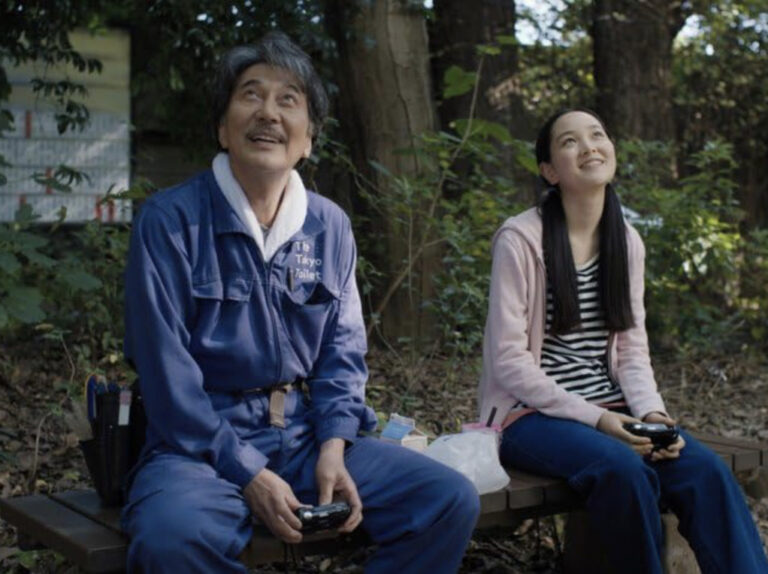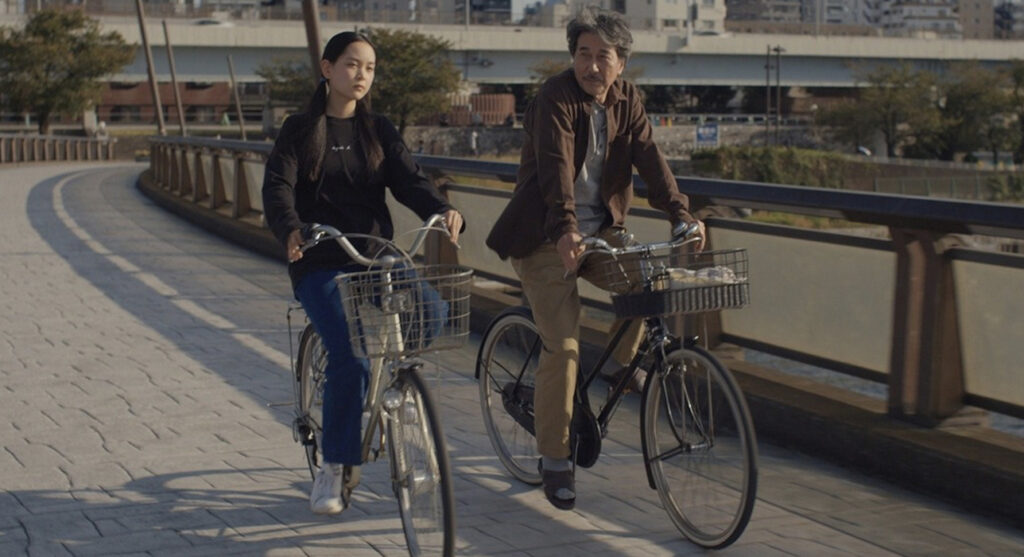
Illuminating the thoughts, feelings and self-awareness of protagonists from diverse backgrounds is one of the most realistic ways for character-driven movies to reflect on the magnificence of ordinary, day-to-day life. Actor Kōji Yakusho’s main character of Hirayama shares his opinions and emotions in an unassuming, sincere way as he indulges in life’s simple pleasures in the sentimental new drama, Perfect Days.
Master German filmmaker, Wim Wenders directed the feature. The helmer also co-wrote Perfect Days‘ script with Takuma Takasaki. Along with Yakusho, the duo also served as producers on the movie.
Perfect Days is presented in Japanese with English subtitles. It has been selected to serve as the Japanese entry for the Best International Feature Film at the upcoming 96th Academy Awards.
Perfect Days chronicles Hirayama’s life as a good-natured cleaner of public toilets in Tokyo’s Shibuya district. Though the accomplishments he has achieved in his life are modest, he nevertheless takes great pride in his work as he marvels at the buzzing Tokyo streets around him. The protaognist’s world is also full of analog joys, from his beloved books and plants to his cassette tapes that are packed with American rock-and-roll classics.
However, Hirayama’s days are not without flashes of drama. He contends with the tumultuous personal lives of the poople he encounters while he works and in his personal life. The protagonist must also cope with the shannonigans of his free-spirited younger co-worker Takashi (Tokio Emoto).
Though he observes these happenings with wry bemusement, Hirayama faces a more personal disruption when he gets an unexpected visitor: Niko (Arisa Nakano), the daughter of his estranged sister, Keiko (Yumi Aso). While he enjoys spending time with his adolescent niece, he must also face his sister and the differences between them that eventually drove him to cherish his solitude.
Serving as a conmpleative reflection on the splendor of leading an ordinary life, Perfect Days is a late-career masterpiece from Wenders that’s relatable to people of all cultures. Through emotional and subtle storytelling, the filmmaker poetically captures Hirayama’s carefully scheduled and steady routine.

Wenders has crafted a movie of powerful simplicity, as even the tiny details of Hirayama’s seemingly mundance routine existence are crafted with a soulfulness and empathy. While classified as a drama, the feature also thrives in the fact that the protagonist isn’t presented with any cynicism.
Instead Hirayama embraces the things that make life meaningful, which Yakusho powerfully conveys in his performance. The actor amps up his soft-spoken character’s careful reflection on the positive, charming aspects of life more through his facial expressions. Hirayama’s body language is heightened in intimacy in a 1.33:1 aspect ratio, which is expertly captured by the film’s director of photography, Franz Lustig.
Unlike his unmotivated junior co-worker Takashi, who’s usually too distracted on his phone to do a thorough job, Hirayama thrives in his position; he embraces a positive attitude that he’s helping the public by offering them clean public facilities. While to most people, the protagonist is invisible by doing such work, he still realizes that even leading a humble, invisible life can contain spiritual fulfillment.
The tender, hopeful embrace of the simple blessings in Hirayama’s life that maintain the peace he treasures are also highlighted by his extensive collection of cassette tapes by ’60s and ’70s rock artists. The surprising music collection that he listens to in his van while he drives to work includes songs from such musicians as The Rolling Stones, Otis Redding and The Kinks. Notable standout songs include The Animals’ House of the Rising Sun and Van Morrison’s Brown Eyed Girl.
The tracks reflect Hirayama’s appreciation of a simplier time in society. He values the time when people actually spoke to each other directly, instead of on their phones, like Takashi and Niko.
While the protagonist appreciates the simplicity of earlier decades, he also embraces true human nature when he shows his unease while discussing his family relationships with Niko and Keiko. When his estranged sister shows up in a luxury car with a driver at his humble apartment to pick up her daughter, the movie offers insight into the affluent life and family friction Hirayama left behind.
While he assures his niece that he enjoys his simple life, Hirayama’s underlying body language once again reveals his true emotions: that he has feelings of sadness and lost affection that remain with him.
Overall, Perfect Days offers a patient examination of process and routine, particularly through its emotional and subtle script. The drama’s bittersweet story is combined with Yakusho’s brilliant performance as the protagonist who carefully appreciates the positive, intimate cinematography and reflective score. Overall, the film is a humane, hopeful embrace of everyday blessings, which make it Wenders’ most rewarding features.
Perfect Days screened in the Masters of Cinema category at the 32nd Philadelphia Film Festival on October 25.
The feature’s screening at the Philadelphia Film Festival comes after it competed for the Palme d’Or at the 2023 Cannes Film Festival, where it premiered on May 25. While at Cannes, the movie won the Prize of the Ecumenical Jury and the Best Actor Award for Yakusho.
Grade: A-
Check out more of Karen Benardello’s articles.
Here’s the trailer of the film.

